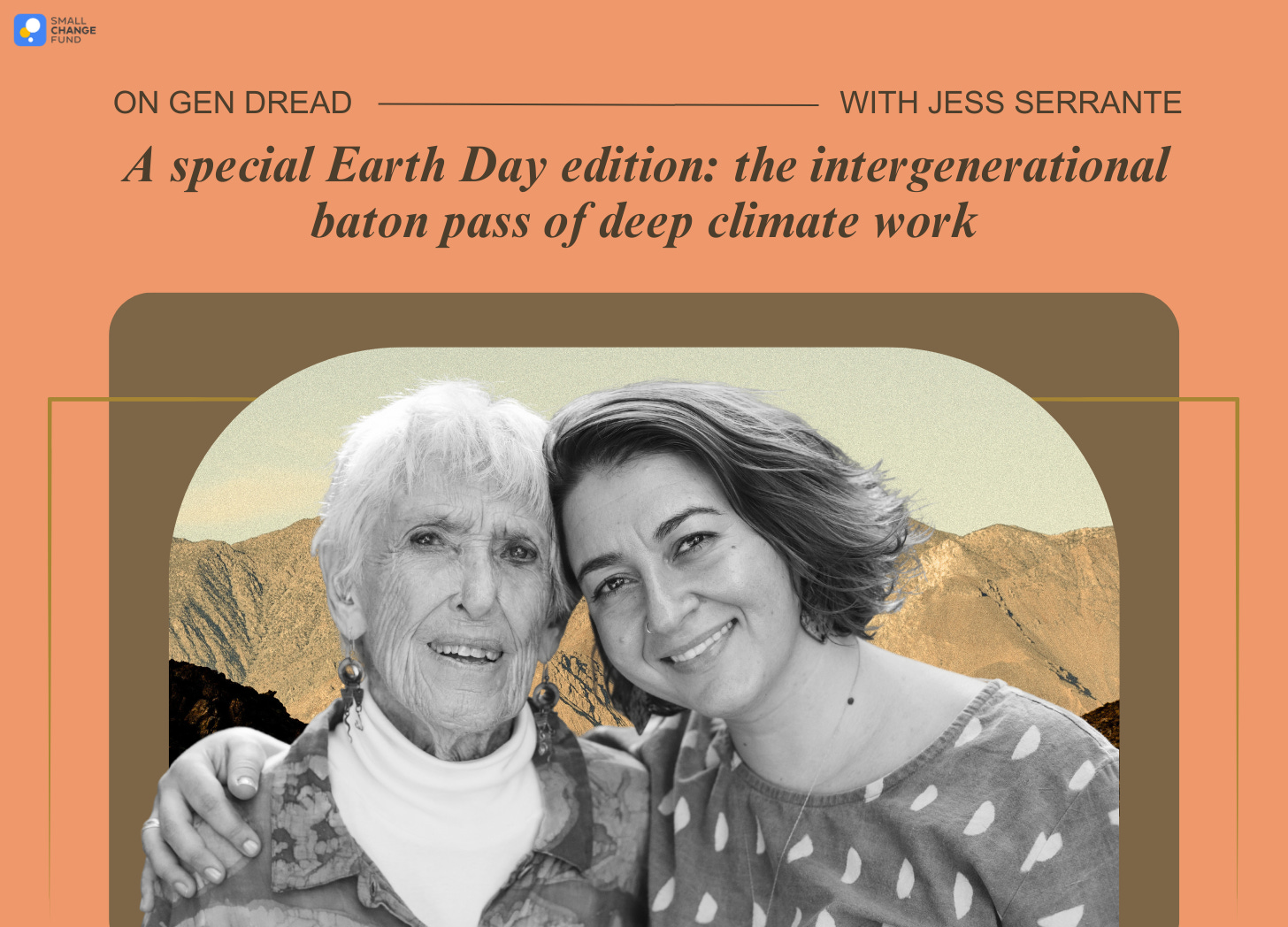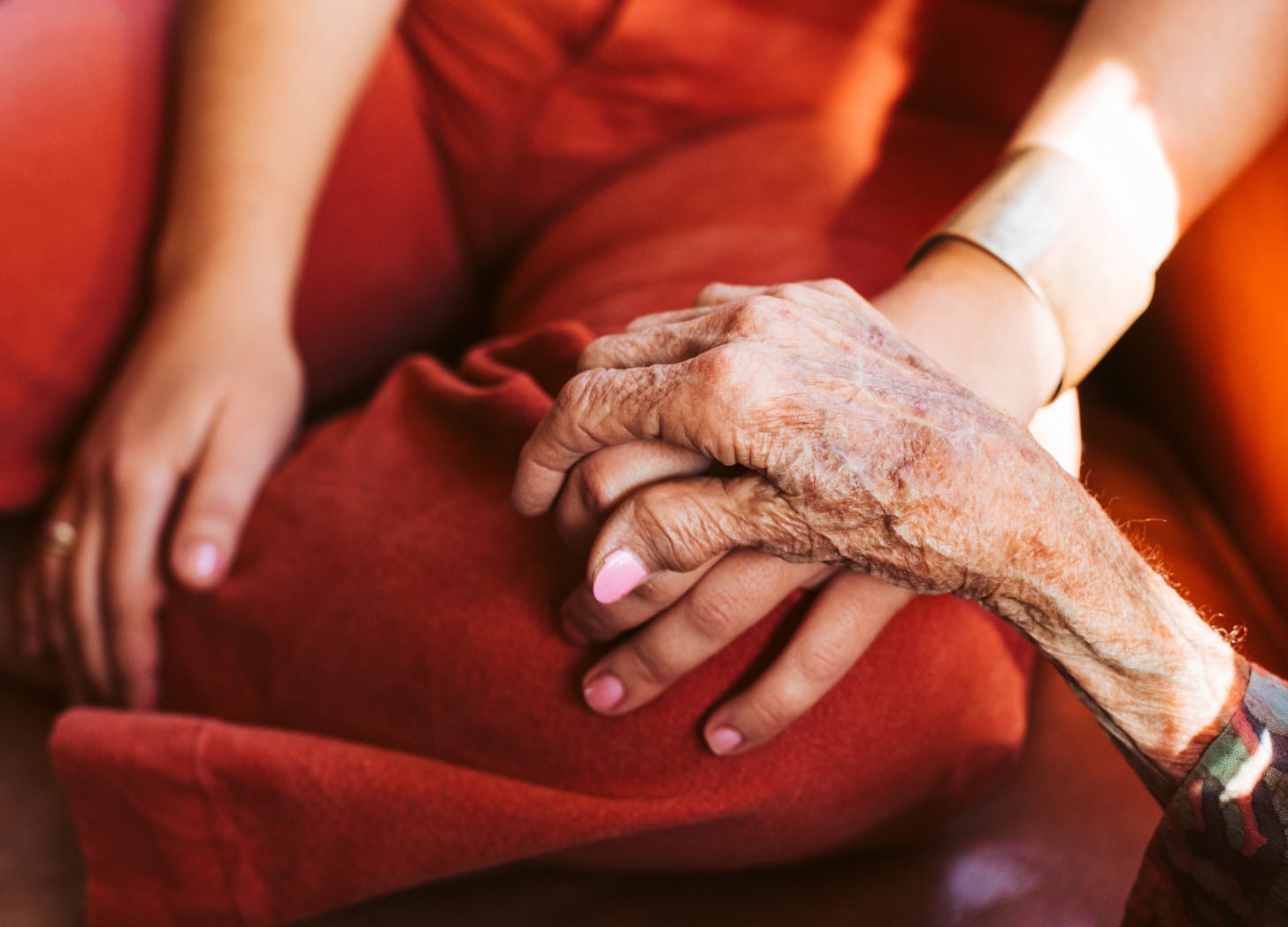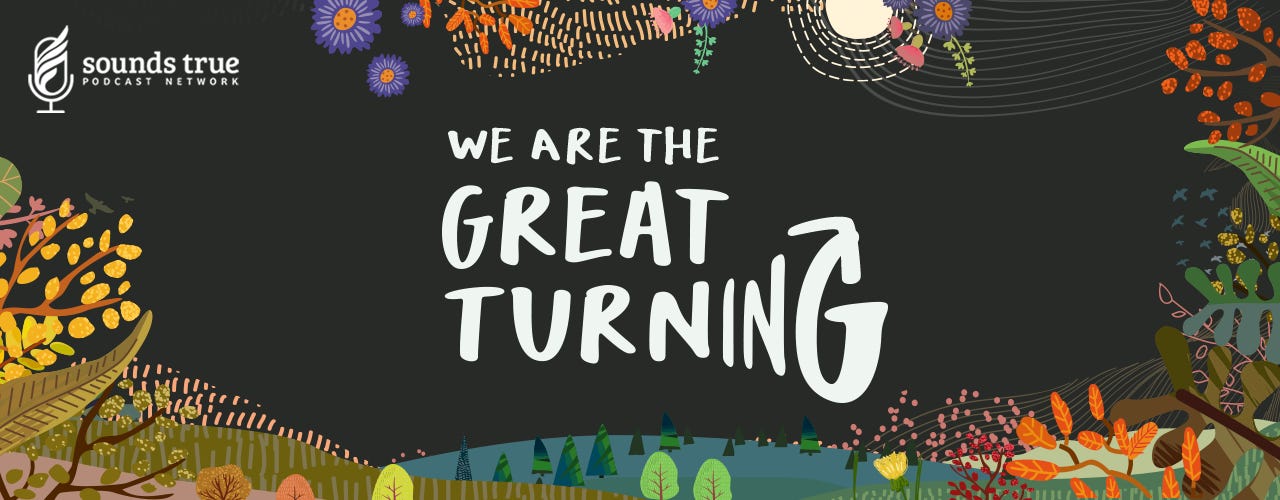A special Earth Day edition: the intergenerational baton pass of deep climate work
Joanna Macy and Jess Serrante launch a brave, fascinating, and vulnerable new podcast called We Are The Great Turning
Two breakdowns, decades apart.
In 1977, Joanna Macy was inconsolable. She was a PhD student just waking up to the extent of the environmental destruction happening as a result of corporate capitalism. She described the epiphany as “an avalanche of grief.” The other woman in this story, Jess Serrante, wasn’t even born yet.
But three decades later in 2006, Jess Serrante was sitting in her freshman environmental studies class at college, engulfed by a similar heartbreak and existential distress as she began to grasp the vastness of that same crisis.
Jess eventually found her way to the redwood forests of California where Joanna was leading an interactive group healing workshop called The Work That Reconnects. The experience was utterly life-changing.
Joanna is now 95. She’s become a legend in the environmental movement – a deep systems thinker responsible for inventing groundbreaking frameworks of experiential group work. She’s a Buddhist scholar and a proponent of deep ecology philosophy. She’s written 12 books. She’s a clear-eyed, open-hearted activist for this planet, and her work has been used and taught and built upon worldwide.
Jess, who's in her 30s, is a facilitator and coach for climate activists (Britt credits her as a pivotal support in her own climate career). Jess now calls Joanna a cherished mentor, a dear friend, and as of this week, her co-host of a powerful and astonishing new podcast called We Are The Great Turning: a kitchen table conversation between Jess and Joanna about climate grief, aging, emotional resilience, and how to make it through the climate crisis with our hearts protected, but still wide open.
We Are The Great Turning just launched on Earth Day 2024, and we urge you to spend some time with these deep, vulnerable, and life-affirming conversations. Here’s a bit more about the podcast from Jess:
Why was your first encounter with Joanna so life-changing? What were you missing in your life that you found in her work?
JS: It’s like I was running around trying to fight to protect our planet, but I was doing it without being plugged into my energy source: my incredible love for this planet and my passion for life and justice. And without being plugged into that, I was just running on a way lower battery. I was under-resourced.
When I met Joanna, the first thing that really blew everything open for me was what she calls honouring our pain for the world, which is about speaking the truth of our heartbreak, our fear, our sorrow, our numbness, even our anger. If we're not naming those feelings, then we're cut off, we're numb. When we're numb, we can't feel our connection to the world. And I began to get the tools to replace the numbness I had adopted as a self-protection strategy from years of pushing against these big systems. I started to feel safe to let myself feel all of the harder feelings and when I got access to safely feeling those, I also got access to the other side, which is my incredible love and my incredible connection.
How does it make you feel that Joanna felt such acute eco-distress three decades before you? Is it frustrating that there’s been so much acceleration of the crisis since her time?
I feel grateful because it reminds me that I am a part of a profound intergenerational project. The issues we're dealing with started way before us and they will go on after us. And there's something about that deep-time framework that I’m really moved by, because I think it rightfully takes a bit of the pressure off of the urgency. That's not to say that this moment isn't extraordinarily urgent, but when I remember that I'm a part of a lineage, I can sort of relax because it's not all on me. And it's so easy to fall into that thinking as a product of a hyper-individualist culture here in America.
In The Work That Reconnects, we will sometimes take on the voice of an ancestor or the voice of a future being so that we get the experience of actually talking across time in that way. And it's really extraordinary because by imagining a connection to people who are not on this physical plane with us, we start to actually feel one.
That’s such a moving thing about your podcast. You can really hear the deep love you two share for this planet. You can almost hear that love stretched across the generations.
Yes. Joanna is 95. She doesn't work anymore. And she's like, all right, kid, you're up. You get to figure out what it looks like from here. Innovate. Go. And from a purpose perspective, that is one of the greatest gifts of my life. Before this podcast came into my life, I had stepped back from a lot of my work and was really looking for a sense of clarity and purpose. This absolutely gave it to me.
I really feel that intergenerational baton pass: I'm done, your turn. And that's a deep honour, especially in a time and in a society where so many of us are cut off from our elders and from our ancestors and from lineage.
If you liked reading this, feel free to click the ❤️ button on this post so more people can discover it on Substack 🙏🏼
We're fueled by you, dear readers, and we’d be so delighted if you'd consider becoming a paid subscriber or supporting us with a one-time donation through our partner, Small Change Fund. Thank you, truly, for being here 🙏🏼
‘Till next time!








I’m really excited about this new podcast and especially about the intergenerational aspect of the conversation. What a gift to hear Joanna Macy’s voice at age 95!
GRIEF and LOVE, so intertwined:
"...honouring our pain for the world, which is about speaking the truth of our heartbreak, our fear, our sorrow, our numbness, even our anger. If we're not naming those feelings, then we're cut off, we're numb. When we're numb, we can't feel our connection to the world."